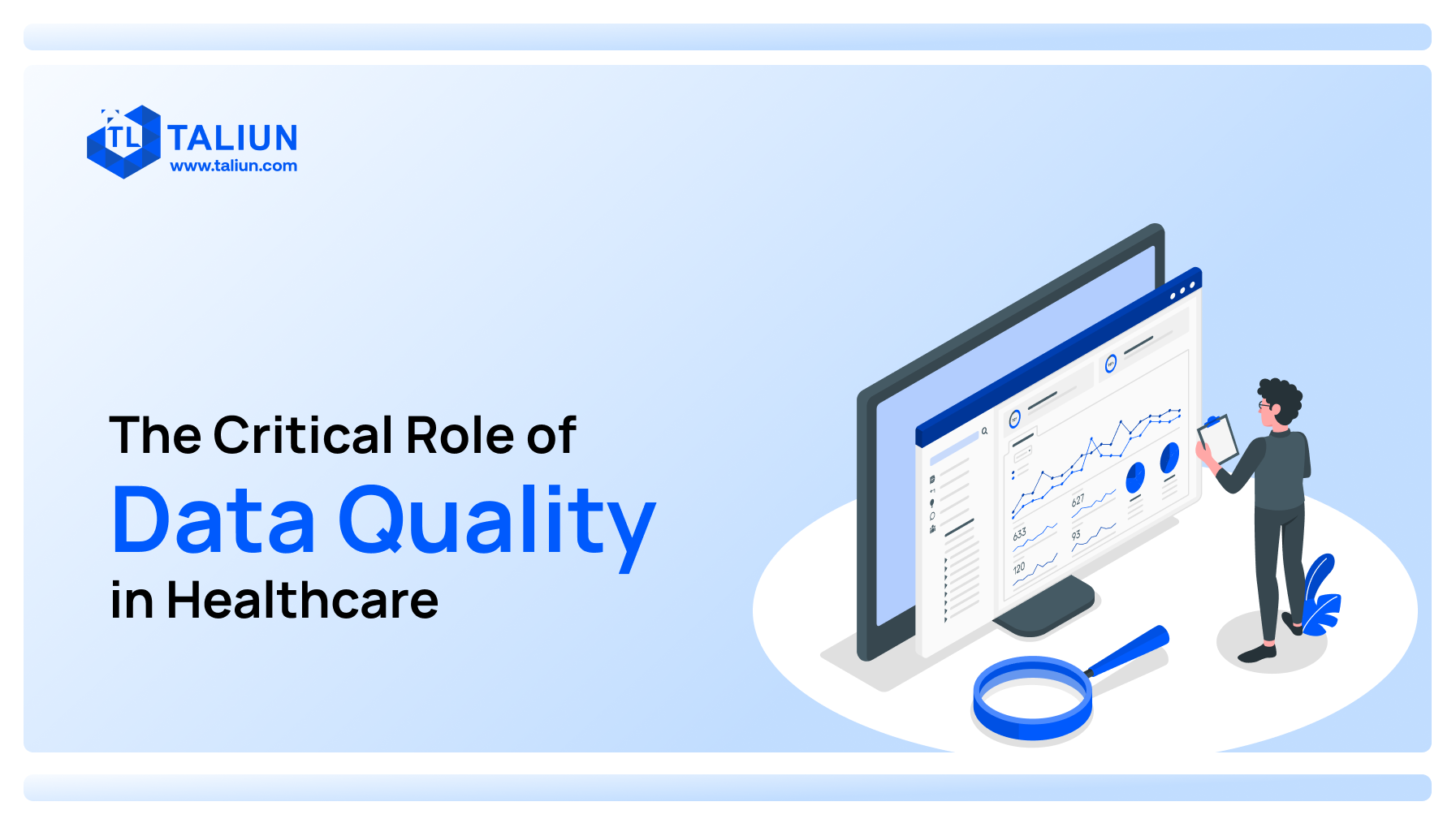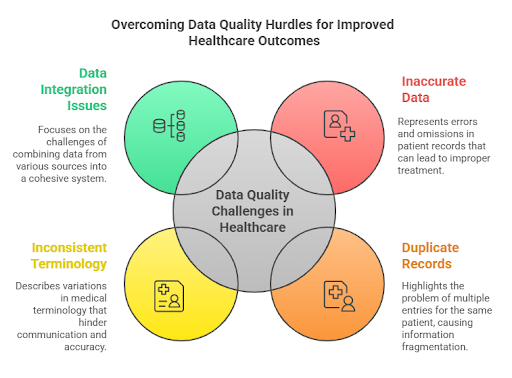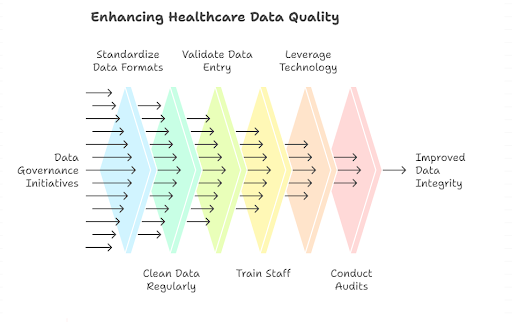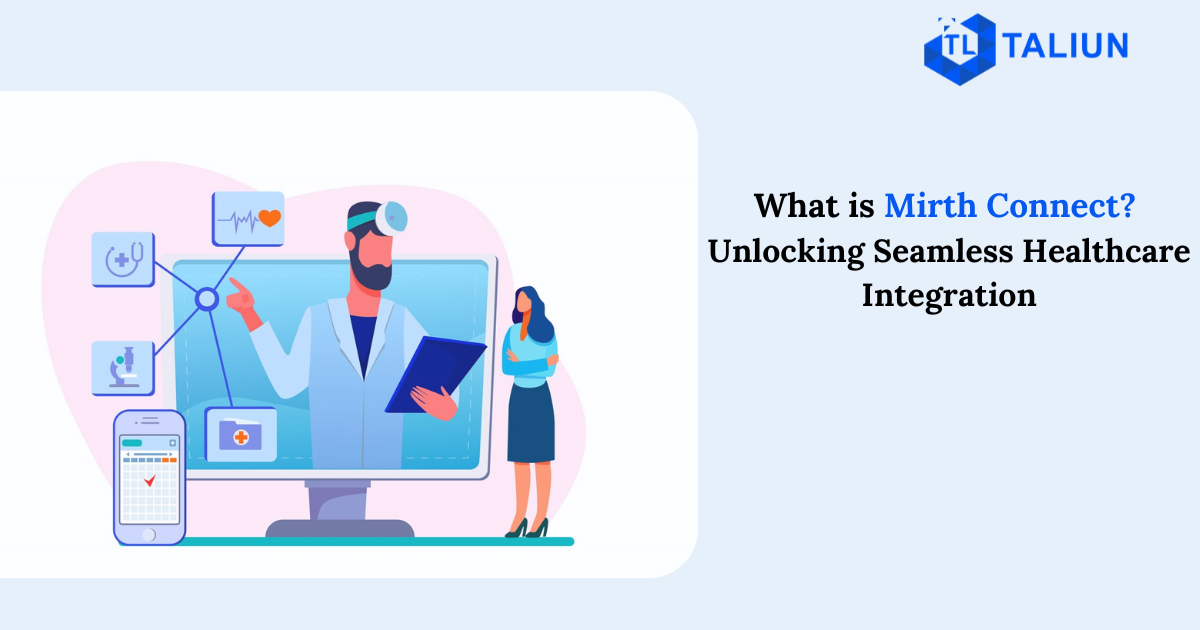The Critical Role of Data Quality in Healthcare

In today’s digital healthcare environment, data quality is no longer just an operational consideration; it’s a crucial factor that directly influences patient outcomes, treatment accuracy, and healthcare efficiency. As healthcare organizations continue to leverage vast amounts of data to guide decision-making, maintaining high-quality data is essential for delivering safe and effective care. This blog delves into the importance of data quality in healthcare, the risks associated with poor data quality, and actionable strategies to enhance data integrity across healthcare systems.
Why Data Quality is Vital in Healthcare
High-quality healthcare data forms the foundation of informed clinical decisions and effective patient care. Accurate, real-time data empowers healthcare providers to make quick, informed choices on diagnoses, treatment plans, and interventions. On the flip side, poor data quality can have severe consequences, such as misdiagnoses, delayed treatments, and increased risk to patient safety. For example, an erroneous entry in a patient’s electronic health record (EHR) could trigger the wrong treatment protocol, putting the patient’s life at risk.
Additionally, healthcare data is highly sensitive and subject to strict privacy regulations like HIPAA (Health Insurance Portability and Accountability Act). Therefore, compliance with these regulations demands not only secure data practices but also accurate and complete data to safeguard patient privacy while enabling data-driven insights for better care.
Ultimately, ensuring high data quality is not just a best practice but a fundamental obligation for healthcare organizations committed to delivering high-quality, patient-centric care.
Common Data Quality Challenges in Healthcare
Despite its critical importance, many healthcare institutions face significant challenges when it comes to maintaining data quality. Some common issues include:
- Inaccurate or Incomplete Patient Data: Data entry errors and incomplete documentation can distort patient records, leading to improper diagnosis or treatment.

- Duplicate Patient Records: Multiple records for the same patient can fragment essential information, leading to confusion, redundant tests, and unnecessary treatments.
- Inconsistent Terminology and Coding: Variations in medical terminology and coding systems across different departments can hinder seamless communication between healthcare professionals, resulting in errors or delays.
- Data Integration Issues: Healthcare systems often rely on data from multiple sources (EHRs, medical devices, insurance claims, etc.), and improper integration can cause missing or inconsistent data.
These issues not only risk patient safety but also lead to operational inefficiencies, increased healthcare costs, and compromised clinical outcomes.
Key Metrics for Measuring Healthcare Data Quality
Effective data quality management requires clear metrics for assessment. Key metrics include:
- Accuracy: Ensuring that data is correct, free of errors, and aligned with real-world facts.
- Validity: Verifying that data conforms to predefined criteria relevant to its intended use.
- Reliability: Maintaining consistent data across various systems and sources.
- Cohesiveness: Ensuring completeness, so decision-makers have a comprehensive view of patient data.
- Uniqueness: Minimizing duplicate entries to ensure each patient’s record is distinct and reliable.
- Timeliness: Providing up-to-date information to enable quick, informed decisions.
By evaluating data against these standards, healthcare organizations can identify data quality gaps and take targeted actions to resolve them.
Proven Strategies to Improve Data Quality in Healthcare
Improving data quality is an ongoing process that involves multiple layers of effort. Here are seven actionable strategies to help healthcare organizations enhance data integrity:
- Establish Robust Data Governance
Implementing comprehensive data governance policies ensures that healthcare data is consistently managed throughout its lifecycle. Governance includes protocols for data collection, storage, sharing, and ongoing quality control. - Adopt Data Standardization
Standardizing data formats, terminology, and coding systems across healthcare departments is vital for ensuring consistency. Frameworks like FHIR (Fast Healthcare Interoperability Resources) can aid in achieving interoperability and better data flow between different systems. - Implement Data Cleaning Processes
Regularly performing data cleaning tasks such as removing duplicates, correcting inaccuracies, and updating outdated information helps maintain the quality of data over time. - Leverage Data Validation Tools
Use automated validation checks during data entry to catch errors early. Ensuring that data is entered according to established standards can significantly reduce human error and enhance data reliability.

- Train Healthcare Professionals on Data Management
Regular training and awareness programs for staff involved in data collection and management create a culture of accountability, ensuring that everyone follows best practices for maintaining data quality. - Utilize Advanced Technology Solutions
Healthcare organizations can leverage advanced technologies such as Electronic Health Records (EHR) systems and AI-powered tools to automate data collection and management, improving accuracy and efficiency while reducing human errors. - Conduct Routine Data Audits
Regular data audits are essential to proactively identify and address issues before they snowball. Continuous monitoring ensures that data integrity is maintained throughout the organization.
Conclusion: The Future of Healthcare Data Quality
The importance of high-quality data in healthcare cannot be overstated. Reliable data is key to improving patient safety, delivering effective care, and enhancing operational efficiency. By establishing strong governance, adopting standardization practices, utilizing advanced technology, and focusing on continuous monitoring, healthcare organizations can improve the accuracy and reliability of their data.
Investing in data quality not only improves patient outcomes but also drives cost savings, enhances operational performance, and supports informed decision-making. As the healthcare landscape continues to evolve with new technologies and increasing data complexity, organizations must remain committed to maintaining high standards of data quality to stay competitive and ensure optimal care delivery.
Improve Your Healthcare Data Quality Today
Take the first step toward enhancing your data quality. Visit Taliun to explore more resources and learn how we can help your organization achieve better data integrity and operational efficiency.




